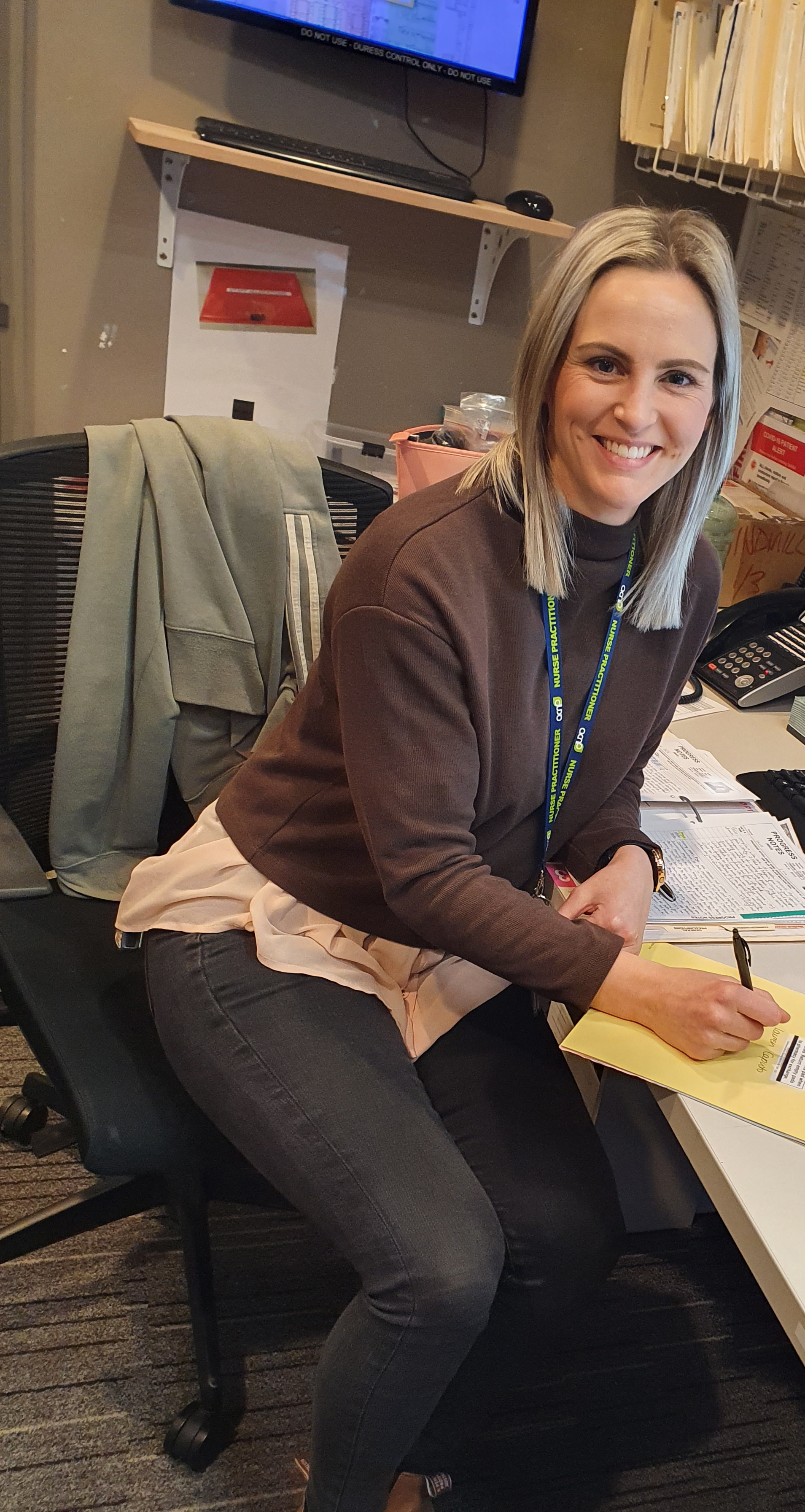15 October 2021
Article from October 2021 edition of INPractice
‘Alcohol withdrawal in its most severe form is a medical emergency’
More than five people a day lost their lives to drugs in Australia in 2019, research from the National Drug and Alcohol Research Centre shows.
Adelaide nurse Lauren Caputo has seen first-hand the harm substance use does to so many lives, having worked alongside police at the Adelaide City Watch House counselling those in custody, often as a result of drug and alcohol use.
Miss Caputo is today a Nurse Practitioner specialising in Alcohol and Other Drugs at Drug and Alcohol Services SA (DASSA), based at Glenside Health Services.
“My role at DASSA is a clinical leadership role, involved in the management of substance use withdrawal. It’s a sub-acute setting, an inpatient setting that DASSA has run for many, many years,’’ she says.
“We support people withdrawing from substances that perhaps have complex medical co-morbidities, that have had difficult withdrawal syndromes in the past and need close supervision and medication to assist in the withdrawal process.
“My role as a nurse practitioner is not only to support the nursing care needs of this higher risk group of people but also assist with the prescribing of the medication that helps manage their withdrawal.
“Depending on the particular substance, withdrawal can manifest as agitation at a low level. In severe cases we have ‘delirium tremens’ in alcohol withdrawal and the risk of seizures from abrupt cessation of alcohol. We also manage a lot of patients who have an injecting drug use history.’’
In addition to methamphetamines, another drug appearing on the streets is GHB (Gamma-hydroxy butyrate), also known as fantasy. Other nicknames include Grievous Bodily Harm or Coma in a Bottle.
“It’s a fairly new substance that we are seeing manufactured and sold locally,’’ Miss Caputo says.
“We have encountered quite a few presentations where withdrawal from this substance is met with a history of seizures and perceptual disturbances, so that poses a lot of risks.”
“We know that some younger people are using GHB, including vulnerable young people. Certainly, it is an emerging substance that we have been looking at. In response to reported increases in GHB use and harms including overdose and acute withdrawal, DASSA developed GHB advice for health workers focused on raising awareness, preventing overdose, and managing withdrawal.’’
Miss Caputo says data from overseas suggests the COVID pandemic has seen an upswing in substance use.
“I think just looking at the data from the US and Asia, it seems that social isolation with quarantining and social distancing, which we’ve also experienced in Australia, has likely contributed to an increase in substance use. This has meant that when those restrictions are lifted, and people start re-engaging in the community, they have found their substance use to be more problematic than perhaps it once was.
“From our perspective (anecdotally) I think we’ve had a steady management of people in terms of presentations to our service. (Withdrawal Services Glenside.)
“It (COVID) has had an effect on people’s mental health and we know that mental health and comorbid substance use definitely correlate. We acknowledge that that’s probably increased and we’ve taken steps to increase access to treatment to assist those affected.’’
She doesn’t consider the job dangerous as “we’re a voluntary service here, so people elect to come and see us and stay with us, so it is really up to them.
“And, of course, if they decide when they get here and only stay for a short period of time, that they’re actually not ready to make a change, we encourage them to reconsider their options and perhaps re-refer when they are in more of a state of change. All of our services, including Withdrawal Services, are attended by clients voluntarily.”
Miss Caputo’s background is predominantly in mental health. “I did my first postgraduate qualification in mental health nursing, so I have used a lot of those skills in managing people with substance disorders as well,’’ she says.
Born and bred in Adelaide, she completed her undergraduate in nursing at Adelaide University in 2009.
 Above: Nurse Practitioner Lauren Caputo
Above: Nurse Practitioner Lauren Caputo
believes alcohol is under-represented in terms
of its risk to health.
“I spent a couple of years working at the old RAH where I completed my nursing graduate program and spent a year in the emergency department. I then decided where I’d like to specialise after having managed quite a few patients in the emergency department with mental health issues in crisis.”’’ Miss Caputo says.
“I then relocated to the Women’s and Children’s Hospital and spent five years working in the child and adolescent mental health inpatient unit.
“I then looked to diversify a little bit more into a drug and alcohol field and took up a position at the City Watch House in collaboration with SA Police managing people under arrest and in police custody.
“People in police custody often become involved with police due to drug-related or substance use and this has provided an opportunistic service in terms of brief intervention, counselling, crisis intervention and assistance with managing substance use withdrawal whilst in custody for prolonged periods.
“It was also very much a service which hoped to assist with pressure on hospital emergency departments and support police from an educative perspective to better manage people with difficult behaviours related to substance use and intoxication.
“We also worked very closely with police to develop their own guidelines around managing intoxicated prisoners as well.
“It was the most challenging role to date I’ve worked in,’’ Miss Caputo says. “Not just because of the environment but because of the scope we were faced with in terms of mental health issues, substance use issues, wound care, injuries, diabetes management, the homeless population and the sorts of health issues that come with homelessness and ‘sleeping rough’ and not routinely accessing health care.
“Sometimes we were the only health practitioners that individuals would ever see in their journey. It was very much a dynamic role.’’
Miss Caputo says working at the Watch House also provided an opportunity to intervene with younger people before substance use became too great an issue “and hopefully instigating some change earlier than later’’.
“To consider that you have come into contact with police and are now in police custody as a young person can be quite confronting,’’ she says.
“That crisis people are faced with is often the strongest vehicle for change long-term.’’
Although methamphetamine has long dominated headlines as a huge social threat, Miss Caputo says alcohol, “and this is purely my opinion, I think is under-represented in terms of its risks to health and predisposing a number of people to chronic health issues.
“Certainly, alcohol continues to be something we manage in terms of withdrawal as one of the more risky withdrawals and withdrawal syndromes.
“It would be difficult to compare one (substance) with the other, they’re both very different. I don’t necessarily think one is worse than the other for any particular reason. I think they’re equally as risky in their own right.
“I definitely think substance dependence, the public seem to be increasingly more accepting of it as a medical condition. Substance-use dependence is something that is a medical issue and certainly alcohol withdrawal in its most severe form is a medical emergency and the complications of chronic alcohol use like cirrhosis, etc, are quite profound complications,’’ Miss Caputo says.
“I think there is a better understanding of this condition, whereas there’s been less of an acceptance, and greater stigma experienced by those dealing with substance-use dependence.
“Education is really important, making substance use support services more readily available to people who want to make that change, and certainly increasing hours of availability.
“Responding to people in crisis is very important because often it is when people are in crisis they are most motivated to make change and address their use.
“And lifting that stigma around substance use and reinforcing that it doesn’t discriminate and being as supportive and non-judgmental as possible.’’

Click here to read the October 2021 edition of INPractice